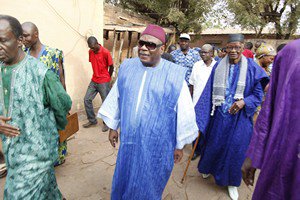A second round of elections [1] [fr] will be necessary to determine who will be the next president of war-torn Mali.
The next vote will decide a winner between former Prime Minister Ibrahima Boubacar Keita [2] [fr], who received about 48 percent of the first vote, and Soumaïla Cissé [3] [fr], who gained about 24 percent.
Mali has been plagued with a conflict with different rebel groups [4]in the northern region for the last year and a half. At the peak of the crisis, a military junta led by Captain Amadou Sanogo removed then-president Amadou Toumani Touré in 2012 and took over [5] as a governing body.
Political affiliations aside, the overall voter participation is already cause for celebration. This election is a first step towards a return to normalcy for a country that also faces a refugee crisis [6] and food shortage [7]. The second round will take place on August 11.
The contenders
The early returns from the first round indicated that Ibrahim Boubacar Keita [2] [fr] was the frontrunner to become the next president, with 55.93 percent of votes [8] cast for him early on. Keita was prime minister of Mali from 1994 to 2000 under the presidency of Alpha Oumar Konaré. He then was the president of the National Assembly of Mali from 2002 to 2007. He is also the leader of the political party, Rally for Mali (RPM).
His main opponents in the race are Soumaïla Cissé and Dramane Demblé, among others. There were some concerns that the elections would come too soon as some parts of the country in the north are yet to be controlled by the army instead of rebel groups.
While a few candidates have already congratulated Keita [10] on his success, some candidates have already signaled some irregularities in the electoral process. Souamalia Cissé, also a presidential candidate in 2002, claims that some ballots were filled with fraudulent votes. On Koaci blog, Cissé's party stated [11] [fr]:
L’URD, Union pour la République et la démocratie, parti de Soumaila Cissé, est monté au créneau ce mercredi pour dénoncer “un bourrage des urnes”.
The URD, Soumaila Cissé's party, has denounced on Wednesday (31/07) some instances of ballot stuffing.
Cissé's party added:
Malgré ce bourrage, selon nos chiffres, un second tour est inévitable pour départager notre candidat, Soumaïla Cissé, et Ibrahim Boubacar Keïta [..] Le ministre a annoncé un taux de participation de 53% selon des résultats partiels. Cela donne à peu près 3 600 000 électeurs qui ont voté. Cela veut dire qu'il faudra au minimum 1 800 000 voix pour passer au premier tour, or, à ce jour, aucun candidat n'a plus d'un million de voix
In spite of the ballot stuffing and according to our numbers, a second round is all but guaranteed to sort out the winner between Soumaïla Cissé, and Ibrahim Boubacar Keïta [..] The minister announced that the participation rate was at 53 percent from the early returns. It means that just about 3,600,000 voters have gone to the poll. Therefore, at least 1,800,000 vote is required to win in the first round, yet, as of today, none of the candidate has collected more than a million votes.
An important milestone for Mali
Because of the conflict with the rebels, many Malians were displaced from their homes and took refuge in neighboring countries. In the following video available on YouTube from the UN High Commissioner for Refugees UNHCR, Jarrou Ag Ahmed, a Malian refugee in Burkina Faso, explains why the president election is an important step for Mali's recovery:
We want to have a president in order to have peace in our country
Others concur [12], such as Sean Gallagher, Catholic Relief Services country representative in Mali:
The elections are seen as an opportunity in Mali, and people hope that the newly elected leaders can take advantage of this opportunity and address the deep seated problems that have held the country back from working on behalf of the Malian people. There is a sense, also, that the elections will now move the country beyond the coup.
Dr. Christos Kyrou, an expert on peace and conflict resolution, is not quite as optimistic about the new start that the elections may provide for Mali. He explains in the news platform The Fair Observer what lies ahead for Mali and the important challenges it still needs to tackle:
The original causes of the conflict, including poverty, corruption, and the last few years’ persistent drought in northern Mali, are the greatest long-term challenges that the country faces. Also, a lack of elementary infrastructure, job opportunities, water, and basic microeconomic components such as available credit, suggest that unless the international community responds swiftly and provides aid that will target these areas of concern, it will only be a matter of time when the next rebellion takes place.
